Engine Compartment Inspection
Checking the Inspection Locations and Inspection Items
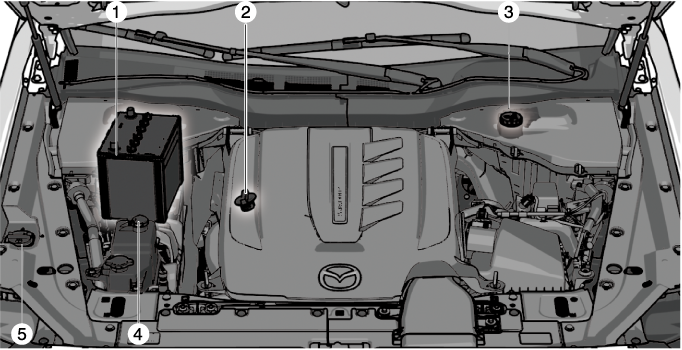
-
Lead-acid battery
-
Engine oil
-
Brake fluid
-
Coolant
-
Windshield washer fluid
Opening the engine cover
-
Open the hood (Search).




Remove the strap when opening/closing the hood. If the hood is opened/closed while the strap is engaged, the strap or hook may be damaged.
Closing the engine cover

-
Pinch the strap and press it in until a click sound is heard, and store.



-
Make sure that the engine cover is securely closed.
Inspecting Engine Oil
Use center display screen indication to inspect the engine oil level.
-
Make sure the hood is closed.
-
Start the hybrid system.
-
Select “Information” on the Home screen to display the vehicle status monitor.
-
Select “Vehicle Status Monitor”.
-
Select “Engine Oil Level”.
-
Select “Start”.
The engine starts and measurement of the engine oil level begins. Do not depress the accelerator pedal during the measurement.
If measurement conditions not shown on the display are not met such as when warm-up operation has not been completed due to low outdoor temperatures, the measurement error screen may be displayed. In this case, drive the vehicle using the engine for a certain period of time to complete the warm-up operation and repeat the procedure.
-
Switch the vehicle power OFF.
Recommended Oil
Use SAE 0W-20 engine oil.
Mazda Genuine Oil is used in your Mazda vehicle. Mazda Genuine 0W-20 Oil is required to achieve optimum fuel economy.
For maintenance service, Mazda recommends Genuine Mazda Parts and Genuine Mazda Premium Oil.
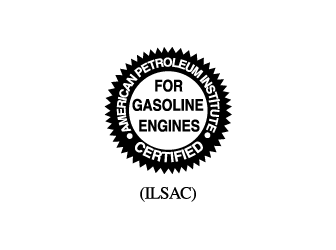
Only use SAE 0W-20 oil “Certified For Gasoline Engines” by the American Petroleum Institute (API).
Oil with this trademark symbol conforms to the current engine and emission system protection standards and fuel economy requirements of the International Lubricant Standardization and Approval Committee (ILSAC), comprised of U.S. and Japanese automobile manufacturers.
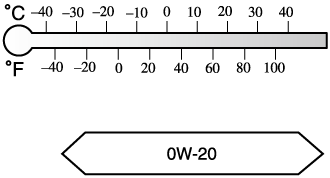
Inspecting the Coolant
Do not use a match or live flame in the engine compartment. DO NOT ADD COOLANT WHEN THE ENGINE IS HOT.
A hot engine is dangerous. If the engine has been running, parts of the engine compartment can become very hot. You could be burned. Carefully inspect the engine coolant in the coolant reservoir, but do not open it.
 Pull over to a safe location, then switch the vehicle power off and make sure the fan is not running before attempting to work near the cooling fan.
Pull over to a safe location, then switch the vehicle power off and make sure the fan is not running before attempting to work near the cooling fan.
Working near the cooling fan when it is running is dangerous. The fan could continue running indefinitely even if the engine has stopped and the engine compartment temperature is high. You could be hit by the fan and seriously injured.
 Do not remove either cooling system cap when the engine and radiator are hot.
Do not remove either cooling system cap when the engine and radiator are hot.
When the engine and radiator are hot, scalding coolant and steam may shoot out under pressure and cause serious injury.
Inspect the antifreeze protection and coolant level in the coolant reservoir at least once a year―at the beginning of the winter season―and before traveling where temperatures may drop below freezing.
Inspect the condition and connections of all cooling system and heater hoses.
Replace any that are swollen or deteriorated.
There are two cooling circuits: one for the automatic transmission, and the other for the engine. Check both circuits.
The coolant should be at full in the radiator and between the F and L marks, and between the FULL and LOW marks on the coolant reservoir when the engine is cool.
There are two coolant reservoir tanks. Check each of them.
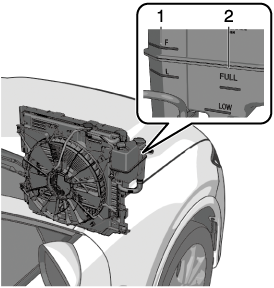
-
The tank for the EV system
-
The tank for the engine
If it is at or near the LOW position, add enough coolant to the coolant reservoir to provide freezing and corrosion protection and to bring the level to FULL.
Securely tighten the coolant reservoir tank cap after adding coolant.
-
Radiator coolant will damage paint. Rinse it off quickly if spilled.
-
If the “FL22” mark is shown on or near the cooling system cap, use of FL-22 is recommended when replacing engine coolant. Using engine coolant other than FL-22 may cause serious damage to the engine and cooling system.
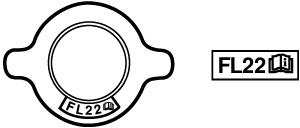
If the coolant reservoir is empty or new coolant is required frequently, consult an Authorized Mazda Dealer.
Inspecting the Brake Fluid
If the brake fluid level is low, have the brakes inspected.
A low brake fluid level is dangerous. A low level could indicate brake lining wear or a brake system leak which could cause the brakes to fail and lead to an accident.
Inspect the fluid level in the reservoir regularly. It should be kept between the MAX and MIN lines.
The level normally drops with accumulated distance, a condition associated with wear of brake linings. If it is excessively low, have the brake system inspected by an Authorized Mazda Dealer.
Before inspecting the brake fluid, remove the hole cover.
Removing the Hole Cover.
Installing the Hole Cover.
-
Insert the hole cover into the cowl grille.
Make sure that the hole cover holds the cowl grille and the knobs are in the correct position.

-
The hole cover
-
The cowl grille
-

Brake fluid reservoir
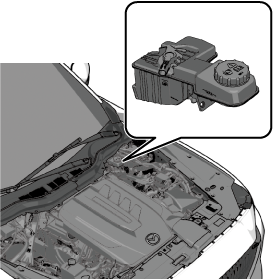
Replenishing Windshield Washer Fluid
Use only windshield washer fluid or plain water in the reservoir.
Using radiator antifreeze as washer fluid is dangerous. If sprayed on the windshield, it will dirty the windshield, affect your visibility, and could result in an accident.
Using Washer Fluid Without Anti-freeze Protection in Cold Weather:
Operating your vehicle in temperatures below 4 ℃ (40 °F) using washer fluid without anti-freeze protection is dangerous as it could cause impaired windshield vision and result in an accident. In cold weather, always use washer fluid with anti-freeze protection.
Do not use soapy water or engine antifreeze in the reservoir as it could cause paint discoloration or pump damage.
-
State or local regulations may restrict the use of volatile organic compounds (VOCs), which are commonly used as anti-freeze agents in washer fluid. A washer fluid with limited VOC content should be used only if it provides adequate freeze resistance for all regions and climates in which the vehicle will be operated.
-
Replenish the washer fluid on a flat surface. If the vehicle is tilted, washer fluid may not fill sufficiently.
Add washer fluid under any of the following conditions.
-
The top of the fluid level is low.
-
The Low Washer Fluid Level Warning Indication/Warning Light (if equipped) turns on.
-
The top of the fluid level is lower than L (if equipped).

Use plain water if washer fluid is unavailable.
But use only washer fluid in cold weather to prevent it from freezing.
Inspecting Lead-acid Battery

 Read the following precautions carefully before using the lead-acid battery or inspecting to ensure safe and correct handling.
Read the following precautions carefully before using the lead-acid battery or inspecting to ensure safe and correct handling.

 Always wear eye protection when working near the lead-acid battery.
Always wear eye protection when working near the lead-acid battery.
Working without eye protection is dangerous. Lead-acid battery fluid contains SULFURIC ACID which could cause blindness if splashed into your eyes. Also, hydrogen gas produced during normal lead-acid battery operation, could ignite and cause the lead-acid battery to explode.

 Wear eye protection and protective gloves to prevent contact with lead-acid battery fluid.
Wear eye protection and protective gloves to prevent contact with lead-acid battery fluid.
Spilled lead-acid battery fluid is dangerous.
Lead-acid battery fluid contains SULFURIC ACID which could cause serious injuries if it gets in eyes, or on the skin or clothing. If this happens, immediately flush your eyes with water for 15 minutes or wash your skin thoroughly and get medical attention.

 Always keep lead-acid batteries out of the reach of children.
Always keep lead-acid batteries out of the reach of children.
Allowing children to play near lead-acid batteries is dangerous. Lead-acid battery fluid could cause serious injuries if it gets in the eyes or on the skin.

 Keep flames and sparks away from lead-acid battery cells and do not allow metal tools to contact the positive (+) or negative (-) terminal of the lead-acid battery when working near a lead-acid battery. Do not allow the positive (+) terminal to contact the vehicle body.
Keep flames and sparks away from lead-acid battery cells and do not allow metal tools to contact the positive (+) or negative (-) terminal of the lead-acid battery when working near a lead-acid battery. Do not allow the positive (+) terminal to contact the vehicle body.
Flames and sparks near lead-acid battery cells are dangerous. Hydrogen gas, produced during normal lead-acid battery operation, could ignite and cause the lead-acid battery to explode. An exploding lead-acid battery can cause serious burns and injuries. Keep all flames including cigarettes and sparks away from lead-acid battery cells.

 Keep all flames and sparks away from lead-acid battery cells because hydrogen gas is produced from lead-acid battery cells while charging the lead-acid battery or adding lead-acid battery fluid.
Keep all flames and sparks away from lead-acid battery cells because hydrogen gas is produced from lead-acid battery cells while charging the lead-acid battery or adding lead-acid battery fluid.
Flames and sparks near lead-acid battery cells are dangerous. Hydrogen gas, produced during normal lead-acid battery operation, could ignite and cause the lead-acid battery to explode. An exploding lead-acid battery can cause serious burns and injuries. Keep all flames including cigarettes and sparks away from lead-acid battery cells.
Before performing lead-acid battery maintenance, remove the hole cover and the lead-acid battery cover.
Removing the Hole Cover
Installing the Hole Cover
-
Insert the hole cover into the cowl grille.
Make sure that the hole cover holds the cowl grille and the knobs are in the correct position.

-
The hole cover
-
The cowl grille
-

Removing the Lead-acid Battery Cover
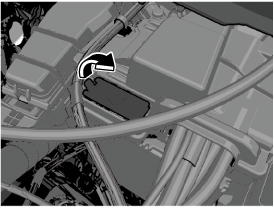
Maintaining Lead-acid Battery
To get the best service from a lead-acid battery:
-
Keep it securely mounted.
-
Keep the top clean and dry.
-
Keep terminals and connections clean, tight, and coated with petroleum jelly or terminal grease.
-
Rinse off spilled electrolyte immediately with a solution of water and baking soda.
-
If the vehicle will not be used for an extended time, disconnect the lead-acid battery cables and charge the lead-acid battery every 6 weeks.
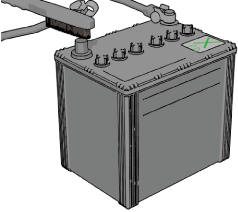
Replacing lead-acid battery
Contact an Authorized Mazda Dealer for lead-acid battery replacement.
Replacing the Fuses
Contact an Authorized Mazda Dealer for fuse replacement.
Inspecting Body Lubrication
All moving points of the body, such as door and hood hinges and locks, should be lubricated each time the engine oil is changed. Use a non-freezing lubricant on locks during cold weather.
Make sure the hood's secondary latch keeps the hood from opening when the primary latch is released.






















































